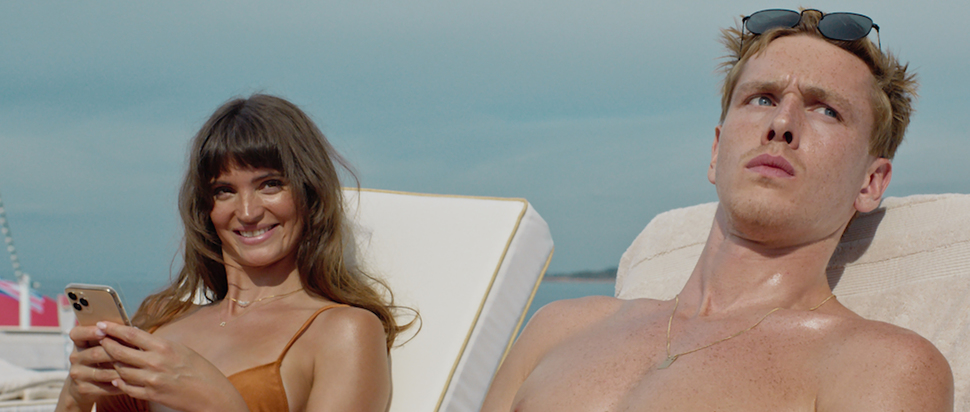Ruben Östlund on class satire Triangle of Sadness
Ruben Östlund, the director of Force Majeure and The Square, takes a sledgehammer to the global elite with his latest satire Triangle of Sadness
Triangle of Sadness, the caustic new comedy from Swedish filmmaker Ruben Östlund, sees a motley crew of uber-wealthy people get put through the wringer during a luxury cruise. Its sledgehammer approach to satire should prove more than a little cathartic, especially given that its arrival in UK cinemas coincides with a right-wing hedge fund bro with an estimated net worth of £730 million becoming Prime Minister in the middle of a miserable cost of living crisis. Triangle of Sadness didn’t begin with the idea of taking those with obscene amounts of money down a peg or two, however. The currency Östlund was initially interested in exploring was physical beauty, which he became fascinated by eight years ago when he met his wife, who’s a fashion photographer.
“I got very curious about her profession and wanted to hear what it would be like to work in her industry,” Östlund tells us over Zoom. His interest was particularly piqued by his wife’s stories about male models. “She explained that the male models earn one-quarter, or less sometimes, of their female counterparts and that they constantly have to manoeuvre powerful homosexual men in the industry that want to sleep with them. They're basically dealing with the same thing as women in other professions. So I thought it was interesting to see that flipped around and maybe it would make it easier to actually talk about these issues because a male character wouldn’t be seen as a victim in the same way.”
The film centres on two bickering models, Yaya (Charlbi Dean) and Carl (Harris Dickinson), who are a couple but Yaya holds all of the cards. It’s her social media clout that pays for their tickets aboard a luxury yacht, where they find themselves rubbing shoulders with obnoxious Russian oligarchs, a lonely tech billionaire and a sweet old English couple taking a break from arms dealing.
These characters are all caricatures but they’re also sharply drawn. To make great satire you need to know your subjects well, and Östlund has spent time observing similar circles. “Of course, I've been in these situations where I’m surrounded by [the mega-rich], like at Cannes and the Oscars and so on, and we actually had some billionaire that was putting money into The Square [Östlund’s similarly scathing satire skewering the modern art world]. So I had some experience.”
Talking of Cannes, that’s where Triangle of Sadness made its world premiere and it’s fair to say Östlund got something of a perverse pleasure screening this delicious takedown of the global elite to that same global elite. “I loved the idea that it was going to be screened in Cannes," he says. "I wanted a tuxedo-dressed audience to take a look at another tuxedo-dressed audience that is dealing with something horrific. I think I’ve always been interested in trying to control the social group that I'm connected to myself.”
The Cannes jury clearly appreciated Östlund’s manipulation. The film won the festival’s top prize, the Palme d’Or, making Östlund among a handful of filmmakers who’ve won the award twice (The Square won in 2017). Critics have been more divided over its qualities, however. Many found this film side-splittingly hilarious, while others have complained Östlund's targets of tech billionaires and beauty influencers are low-hanging fruit. The Swedish director doesn’t have much truck with these grumbles, though. “There are certain critics who have a stick up their own arse,” he says. ”They are only interested in what other people think about them. When they write their reviews they are thinking, ‘Okay, how should I position myself with my reactions?’ They want to be seen to be smarter than the film they are watching.”
He reckons this critical reaction is in some way connected to the traditions of European arthouse cinema, which have tended to be suspicious of films with mass appeal. “If I, as a director, get the money from the Swedish Film Institute, I don't have to reach an audience because I'm already economically safe," he explains. "But if you look at American filmmakers, they have to punch the whole way through and reach the audience, otherwise they will lose their job. Therefore there's a certain kind of cinema in Europe that is posing as if they’re dealing with important topics in a very elitist way.”
He recalls taking a flight from Venice Film Festival to Toronto Film Festival that illustrates his point. “The whole film industry was on this flight, and they are all watching films on their screens. But they were not watching their own films, their important arthouse films, they are watching Adam Sandler. Our aspirational selves want to say, ‘These worthy, important films are the films we like.’ But what we're actually watching is something else. I wanted to break that contradiction with my films.”
With that, he’s surely succeeded. Critics can argue the merits of Force Majeure, The Square and Triangle of Sadness till the cows come home, but one thing can surely be agreed upon: Östlund's films are never boring. And for what it’s worth, I can’t remember the last time I laughed as hard in the cinema as I did watching Triangle of Sadness.
Triangle of Sadness is released 28 Oct by Curzon
